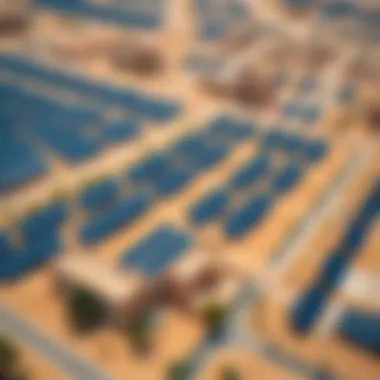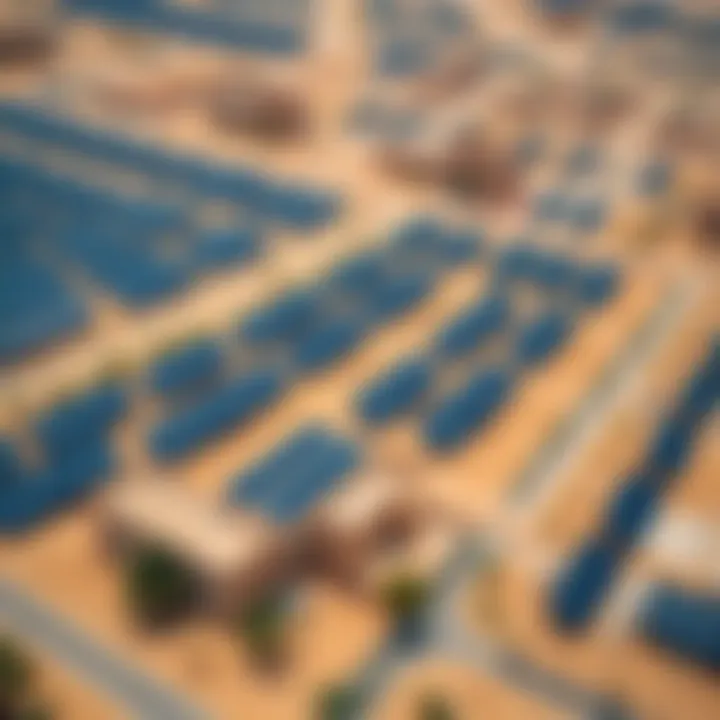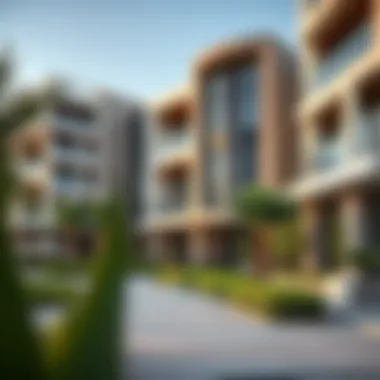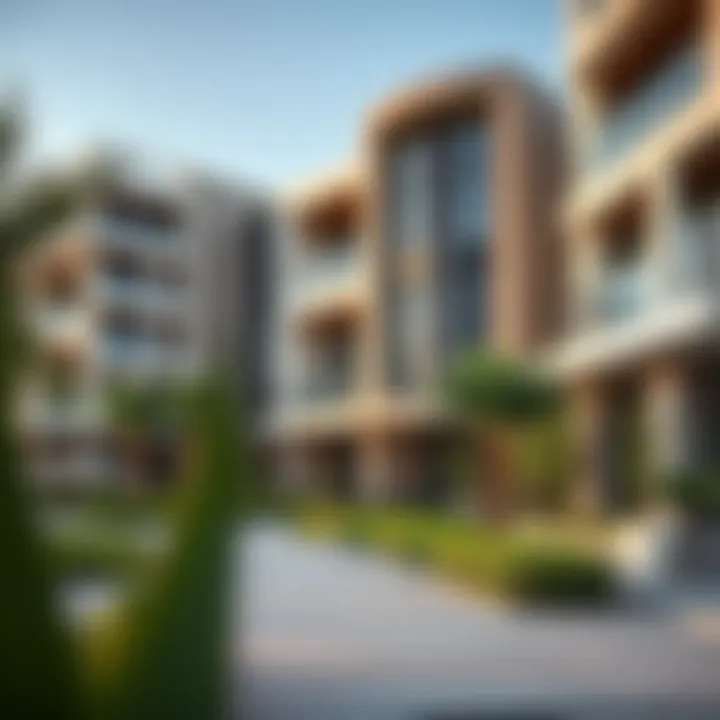Examining Solar Power Costs and Real Estate in Dubai


Market Insights
The world of real estate in Dubai is continually evolving, influenced by numerous factors including technological advancements, economic changes, and environmental considerations. As solar power becomes more mainstream, it’s crucial to understand its cost dynamics and implications on property investment in this vibrant city.
Current Trends in Dubai Real Estate
In recent years, the Dubai real estate market has experienced remarkable shifts. The allure of sustainable living has gained traction among buyers. With its sun-soaked climate, Dubai provides an ideal landscape for solar energy installation, becoming a focal point for development strategies. Developers are increasingly capitalizing on solar technology to enhance property values and appeal to eco-conscious buyers.
Investors are not just seeking out luxury properties; they are also looking at the long-term benefits of generating energy from the sun. Properties equipped with solar panels can lower utility costs significantly, making them more attractive. Furthermore, the UAE government supports solar initiatives, which is a cherry on top for potential buyers and investors.
Analysis of Future Predictions
Looking ahead, the integration of solar energy in real estate will likely expand even further. Analysts predict that by 2030, a substantial percentage of new buildings will be equipped with solar solutions, driven by both technological advancements and increased public awareness. The energy landscape is shifting, and properties that are energy efficient will stand out.
With the government’s Vision 2021 aiming for a sustainable environment, real estate in Dubai is poised for transformation. This could mean huge opportunities for savvy investors who act on these impending trends, paving the way for a market that not only focuses on luxury but also prioritizes energy efficiency.
“Investing in solar-powered properties today could mean savings and increased value tomorrow.”
Investment Strategies
Understanding the potential of solar energy in real estate can provide an excellent edge for investors. Here are some strategies that may be beneficial:
Tips for First-Time Investors
If you’re dipping your toes into the Dubai real estate market, consider these points:
- Research extensively: Know about existing solar initiatives and how they affect property prices.
- Talk to local experts: Real estate agents with a focus on sustainable properties can be invaluable.
- Evaluate the property’s eco-friendly features: Look for solar capabilities as part of the overall valuation.
Understanding Property Valuation
The valuation of solar-equipped properties can differ significantly from traditional real estate. Factors to consider include:
- Solar panel efficiency and brand: High-quality systems add to property worth.
- Energy savings potential: Homes with solar panels tend to have lower utility bills, enhancing their marketability.
- Government incentives: Tax breaks or rebates can increase a property’s attractiveness.
An insightful approach to understanding how solar energy influences real estate leads to more informed decisions. Knowledge is power, especially in a rapidly growing market like Dubai's.
For more information on how solar energy can impact real estate, check out Wikipedia on Solar Energy or Energy efficiencies in buildings to deepen your understanding.
As the sun rises, so too does the opportunity to harness its power—especially in a market like Dubai's.
Prologue to Solar Power in Real Estate
The integration of solar power into the real estate market isn’t just a passing trend; it's becoming a cornerstone of sustainable development, especially in urban environments like Dubai. As the city aims to reduce its carbon footprint and embrace green technology, understanding the implications of solar power in real estate is essential for investors, homeowners, and property managers. It’s not merely about installing solar panels; it encompasses a deeper comprehension of costs, benefits, and long-term sustainability.
Defining Solar Power Technology
Solar power technology refers to the methods and systems used to capture sunlight efficiently and convert it into usable electricity. Most commonly, this is achieved through photovoltaic cells—semiconductors that convert light into electricity. In the context of Dubai, where the sun shines brightly throughout the year, leveraging solar energy becomes not only feasible but also economically attractive.
An often overlooked aspect is the innovation surrounding solar technology. From solar panels that track the sun’s movement to energy storage solutions that provide power during off-peak hours, advancements are persistently reshaping the landscape. Understanding these technologies helps stakeholders make informed decisions, whether they’re considering a simple installation or a large-scale solar project.
Importance of Solar Energy in Urban Settings
In urban settings like Dubai, solar energy brings a myriad of advantages that extend beyond merely cutting costs. Let’s break down a few key benefits:
- Energy Independence: By harnessing solar power, developers and homeowners can reduce reliance on conventional energy sources, leading to lower energy bills.
- Sustainable Development: The push for eco-friendly living is stronger than ever. Solar energy plays a vital role in achieving sustainability goals, allowing cities to thrive without compromising environmental integrity.
- Grid Resilience: Urban populations grow, and so does the demand for energy. Solar power can distribute electricity generation, reducing stress on central grids, especially during peak usage times.
Ultimately, solar energy is positioning itself as a critical player in urban development. It encourages a shift towards smart investment strategies that prioritize environmental health while simultaneously enhancing property value.
"Harnessing sunlight isn’t just an ecological choice; it’s a financial strategy for the modern investor."
In summary, exploring the intersection of solar power and real estate in Dubai is essential for making informed decisions. A thorough understanding of the technology and its significance in urban settings equips key stakeholders to not only embrace solar energy but to thrive in the evolving real estate market.
Analyzing Solar Power Costs
In the realm of real estate, particularly in a vibrant market like Dubai, understanding the financial implications of solar power is essential. This section aims to provide insights into the various costs associated with solar power adoption, helping investors and homeowners make informed decisions. By dissecting these costs, one can gauge the economic feasibility of integrating solar energy into property ventures, evaluate potential returns, and comprehend its long-term benefits and challenges.
Components of Solar Power Costs
Equipment Costs
Equipment costs refer to the expense involved in purchasing solar panels, inverters, and mounting systems. These components form the core of any solar installation and contribute significantly to the overall investment. Notably, the demand for quality solar panels has influenced the market, driving down prices while improving efficiency. Opting for high-efficiency panels might seem like a steep investment initially; however, they can yield substantial energy savings over their lifespan. The unique feature here is the advancement of technology, which has made cutting-edge equipment more accessible. While the upfront expense can be daunting, the longevity and lower energy bills can offset these costs considerably.


Installation Expenses
Installation expenses encompass the labor costs associated with setting up a solar energy system. This aspect is pivotal, as a poorly installed system can lead to inefficiencies and excessive repair costs down the line. On the bright side, seasoned installation teams often provide warranties, ensuring peace of mind for homeowners and investors. Furthermore, installation expenses can vary based on the complexity of the project, such as roof type and layout. While some see it as a necessary hassle, a well-executed installation not only maximizes performance but also adds value to the property itself.
Maintenance and Operational Costs
Maintenance and operational costs should not be overlooked when assessing solar power investments. Though solar systems are generally low-maintenance, they do require periodic check-ups and occasional repairs, particularly in a harsh climate like Dubai's. The beauty of solar technology lies in its durability, leading to fewer operational hiccups. Nevertheless, setting aside a budget for routine maintenance is wise. Investors often find that the overall maintenance expenditures are minimal compared to the returns generated from reduced electricity bills. Thus, this aspect underscores the importance of ongoing care, which ensures that solar systems run efficiently and continue to provide savings.
Factors Influencing Cost Variation
The costs associated with solar power can fluctuate based on several factors, many of which play a crucial role in various aspects of the energy and real estate market. Analyzing these factors allows prospective buyers and investors to navigate the solar landscape more effectively.
Geographic Considerations
Geographic considerations entail the analysis of local weather patterns, sunlight exposure, and installation regulations. For example, Dubai enjoys an abundance of sunshine throughout the year, making it an ideal location for solar energy adoption. The unique feature of this market is the consistent energy production potential. However, installations in areas with less sunlight might not produce adequate returns, making this a key aspect in planning the energy strategy. Furthermore, local building codes and permits can impact installation costs, adding another layer to potential expenses.
Government Incentives
Government incentives significantly shape the financial viability of solar investments. In Dubai, various incentives such as tax exemptions, subsidies, and rebates are provided to encourage solar energy adoption. The key characteristic here is that these programs can greatly reduce initial costs, making solar a more attractive option for homeowners and investors. While the availability of these incentives might vary over time, staying abreast of government policies is essential for maximizing financial benefits.
Market Demand and Supply Dynamics
Market demand and supply dynamics play a crucial role in determining solar power costs. When demand surges, so can the prices of solar components. It's essential to factor in local supply chains and availability, as these can create fluctuations in pricing. Investors should keep an eye on trends, as an increase in demand can lead to more competitive pricing and innovation in technology. While a high demand can drive prices up, the increasing competition in the market often leads to better and more affordable options for solar solutions.
Understanding the various cost elements associated with solar power is not merely about dollars and cents; it is about making informed decisions that reflect both personal and broader environmental goals.
This comprehensive examination of the factors influencing solar costs provides a foundation for investors and homeowners in Dubai's real estate market to navigate their solar journey effectively.
Cost-Benefit Analysis of Solar Power Adoption
Understanding the financial and environmental implications of solar power adoption is paramount for homeowners and investors alike. This section dives into the immediate benefits, long-term returns, and the broader social implications, presenting a comprehensive view of why this investment can be a game changer in the Dubai real estate scene.
Immediate Financial Savings
The allure of solar power often begins with immediate financial savings. When homeowners in Dubai embrace solar energy, they can see a dramatic reduction in utility bills right from the get-go. This reduction might appear trivial at first glance, especially when considered alongside the initial setup costs, but over time, these savings accumulate significantly.
For instance, residential properties equipped with solar panels have reported reductions of up to 50% in energy bills. Given that Dubai experiences long hours of sunshine, the efficiency and output of solar panels is maximized throughout the year. Investors looking into this can equate these savings into tangible income flows, making these properties attractively marketable.
In addition to lower electricity bills, favorable government policies—such as net metering—enable surplus energy production to be fed back into the grid, offering further financial benefits. This creates a dual-channel savings mechanism that can yield compelling returns for property owners.
Long-term Return on Investment
While immediate savings are certainly enticing, the long-term return on investment (ROI) is where solar energy installations truly shine. Investors often view this as a strategic move that not only pays off financially but also elevates property values in the long run.
According to various studies, homes equipped with solar power systems tend to have higher resale values. It’s not just about the lure of lower energy expenses; it's about the future-proofing of properties against rising electricity costs. Homebuyers in Dubai, increasingly aware of the climate change crisis and rising energy prices, are more inclined to pay a premium for homes with established solar systems. This trend indicates that real estate situated in the suburban or urban landscapes of Dubai, with solar installations, can command a better price point.
- A report from Realtor.com noted that homes with solar energy systems sold for an average of 4.1% more than those without.
Consequently, smart investors calculate ROI not just through immediate savings but focus on the asset's marketability and long-term appreciation in value.
Environmental and Social Implications
The implications of adopting solar power extend far beyond financial calculations; they touch on environmental and social realms that resonate deeply with many investors and homeowners today. Solar energy is essentially a renewable resource with a relatively low environmental footprint, particularly significant in a city like Dubai, which is experiencing rampant urbanization and development pressures.
Solar energy reduces reliance on fossil fuels, thereby minimizing greenhouse gas emissions and contributing to cleaner air. This is critical in arid regions such as Dubai, where air quality is often a concern. By taking the initiative to switch to solar power, homeowners play an active role in combating climate change and promoting sustainability.
Moreover, community engagement around solar power can foster social responsibility. Projects that involve local public-private partnerships, like community solar gardens, can improve energy access for lower-income households, ensuring that everyone reaps the benefits of the solar transition.
Investing in solar power in Dubai isn't merely a finance-driven initiative; it resonates with a growing consciousness towards community welfare and environmental stewardship.
Comparative Analysis of Solar Adoption in Dubai
The foray into solar power has undergone substantial shifts across the globe, and Dubai is no exception. Conducting a comparative analysis of solar adoption within this dynamic city is vital for investors and homeowners alike. It presents an array of elements including the technological advancements, cost-effectiveness, and real estate implications, which all play a significant role in shaping the future of property investments in the region.
Several factors make this analysis crucial:
- Market Dynamics: Understanding how solar power is embraced in various neighborhoods reveals trends in property value appreciation associated with solar installations.
- Technological Efficacy: By comparing the performance of various solar technologies being implemented, stakeholders can determine which options yield the best returns for their investments.
- Financial Assessment: Solar energy solutions vary in implementation costs and long-term savings—an insightful analysis can help align investments with suitable financial strategies.
The thorough examination of these aspects provides not only clarity but also a strategic advantage for real estate investors and property managers as they make decisions in an evolving market.
Current Solar Power Landscape in Dubai


Dubai’s current solar power landscape reflects a growing commitment to renewable energy, spurred by ambitious government initiatives. The emirate, with its abundant sunlight, possesses significant potential for solar power generation. Currently, projects like the Mohammed bin Rashid Al Maktoum Solar Park are setting the stage for a sustainable energy future.
Key highlights of the solar power ecosystem in Dubai include:
- Government Incentives: The government’s initiatives, such as net metering and tax exemptions, have created a robust framework that promotes solar investments.
- Rising Adoption Rates: More homeowners and businesses, particularly in urban areas, are starting to install solar panels as a cost-effective energy solution.
- Innovative Projects: Numerous pilot projects are showcasing the integration of solar technologies into various building types, affirming the necessity for innovative designs that cater to both aesthetics and efficiency.
As a result, these developments not only enhance sustainability but they also bolster property values, making the landscape ripe for further investment.
Case Studies of Successful Implementations
Case studies serve as compelling examples of how solar adoption has translated into both financial success and sustainable living. Several projects across Dubai illuminate this journey:
- Bluewaters Island Residence: This upscale development incorporated solar panels into its skyline, significantly reducing electricity costs for residents while enhancing the property’s market appeal.
- Dubai Silicon Oasis: This industrial park adopted an extensive solar framework that powered its facilities, resulting in energy savings and establishing a model for other technology hubs in the region.
- Sustainable City: Home to numerous eco-friendly homes, this development has focused heavily on solar energy, achieving net-zero energy consumption. The community stands as a testament to the financial viability of investments in eco-friendly technology.
These case studies showcase the potential of solar energy to elevate property values and signify the importance of making informed decisions when considering solar investments. Each success story not only underscores the financial and environmental benefits but also sets a standard for future projects in Dubai’s flourishing real estate market.
As Dubai strives toward a sustainable future, understanding the comparative landscape of solar adoption is crucial for making sound decisions in real estate investments.
The Economic Impact of Solar Power on Dubai's Real Estate
The dynamic nature of the Dubai real estate sector is profoundly transformed by the incorporation of solar power technologies. As the world increasingly gravitates toward sustainable energy solutions, the impact of solar energy extends beyond environmental considerations—it shapes property values, market trends, and investment opportunities in ways that are both tangible and significant.
Impact on Property Values
When solar power systems are integrated into residential and commercial properties, they often enhance property values. A home equipped with solar panels can provide potential buyers with not only energy savings but also long-term financial security. The idea is quite simple: Buyers may be willing to pay a premium for properties that promise lower utility bills.
According to studies, properties that showcase solar systems often exhibit price increases of up to 4% to 6% more than similar homes without solar installations. This trend is particularly evident in Dubai, where real estate values are influenced by the growing need for energy efficiency amid rising utility costs.
Furthermore, energy independence is an appealing aspect for many potential homeowners. In a market like Dubai, where the cost of electricity is rising, owning a solar-equipped home feels like a step toward greater autonomy and sustainability.
Influence on Market Trends
The integration of solar power is not just a trend—it is becoming a defining characteristic of the Dubai real estate landscape. As more developers and homeowners consider renewable energy, the demand for solar-ready homes is increasing. This inclination is leading to a shift in how properties are marketed, with sustainability features becoming focal points.
Recent surveys indicate that buyers are increasingly prioritizing properties with eco-friendly attributes. Therefore, developers who embrace solar technology may find themselves at a competitive advantage. Simply put, as solar adoption becomes more mainstream, there’s a distinct market demand for properties that harness these technologies effectively. The result is a ripple effect, driving more investors to consider solar energy not just for its environmental benefits, but also for its role in increasing consumer appeal.
Investment Opportunities in Solar Technologies
For those who see the big picture, investing in solar technologies presents a unique opportunity. Dubai's rapid urbanization means that energy demands will only continue to grow. This creates fertile ground for investors willing to support solar initiatives.
By investing in solar technology, stakeholders can tap into several lucrative avenues:
- Photovoltaic (PV) Installations: Opportunities for real estate developers to incorporate solar systems in new projects.
- Solar Power Financing: Financing solutions specifically tailored for solar installations, which can provide investors a steady return on investment.
- Partnerships with Energy Companies: Collaborating with local energy firms to innovate and drive forward the solar agenda in Dubai’s real estate sector.
In a nutshell, the economic impact of solar power on Dubai’s real estate extends far beyond the immediate financial implications. It’s reshaping property values, guiding market trends, and creating a variety of investment opportunities that may yield significant benefits.
As stakeholders in the real estate market recognize the advantages of solar adoption, they should be well-positioned to strategize accordingly for the future, ensuring long-term sustainability and profitability.
"The future of real estate is not only about location—it is about sustainability and energy efficiency."
Future Trends in Solar Power Costs
The landscape of solar power costs is evolving, particularly in a rapidly developing market like Dubai. Understanding these trends is critical for stakeholders in real estate, from seasoned investors to budding homeowners. The way solar power pricing changes can have lasting implications on property values and market competitiveness. Future costs will be driven by technological advancements and shifts in economic conditions. Hence, analyzing these elements provides insights on how to navigate this shifting terrain.
Technological Innovations
Innovations in solar technology are at the heart of driving down costs. Technologies such as solar panels are continually improving in efficiency and decreasing in price. Advances in materials—especially the development of perovskite solar cells—have shown great promise that could double the efficiency of traditional silicon panels. This can lead to reduced space needs for installations in residential and commercial properties.
More importantly, improvements in energy storage solutions, like lithium-ion and emerging alternatives, enable homes to store solar energy for later use, enhancing utility and further reducing dependence on grid electricity. Real estate investors and developers can position themselves favorably by adopting these technologies early, ensuring properties remain competitive in a marketplace that values sustainability.
For homeowners contemplating solar investment, this means more feasible options are on the horizon. As installations become cheaper, the break-even point for solar adoption shortens, making it a more appealing prospect than in the past.
Potential Price Trajectories
As we look ahead, price trajectories in solar power reflect broader economic indicators. For instance, a rise in demand for clean energy due to increasing awareness of climate change could drive up prices in the short term, especially in regions where solar is not yet mainstream. However, as seen in Dubai, government initiatives promoting solar energy adoption play a substantial role in stabilizing and even reducing costs in the long term.
A critical factor to watch will be the global supply chain. Fluctuations in raw materials, regulatory changes, and shifts in trade policies can affect prices too. Yet, indications suggest that long-term prices will continue to decline, making solar energy investments more attractive. Projections from various renewable energy organizations hint at a scenario where costs could drop to below current levels as production processes become more efficient.
"The transition to sustainable energy demands that we keep a sharp eye on both technological advancements and market trends, laying out a roadmap for future decision-making in real estate."
Investors who plan to enter the solar energy segment or incorporate solar technology into their properties should remain informed about these trends. Making proactive decisions based on anticipated cost trajectories could result in not only immediate savings but also enhance property values over time.


In summary, grasping the future trends in solar power costs is fundamental for anyone involved in Dubai’s real estate landscape. By understanding and adapting to these shifts, stakeholders can make strategic moves that reflect both sustainability and profitability.
Regulatory Framework and Its Implications
The regulatory environment surrounding solar power in Dubai plays a pivotal role in shaping the adoption and integration of this renewable energy source within the real estate landscape. Understanding the regulatory framework can illuminate how government initiatives can drive or hinder solar energy projects. For investors and homeowners alike, grasping these aspects can inform decisions and broaden opportunities within the thriving sector of solar-powered properties.
Government Policies on Solar Energy
In Dubai, various government policies have been implemented to encourage the use of solar energy, reflecting a commitment to sustainability and energy diversification. One notable initiative is the Dubai Clean Energy Strategy 2050, which aims for 75% of Dubai's energy to come from clean sources by that year. Such bold ambitions lay the groundwork for several financial incentives, grants, and subsidies for solar investments.
Moreover, the Dubai Electricity and Water Authority (DEWA) has introduced the Shams Dubai program, which encourages residents and businesses to generate their own solar energy. This policy not only promotes the installation of solar panels but also allows consumers to sell excess energy back to the grid, bolstering the economic case for solar investments.
Benefits of favorable government policies include:
- Subsidized installation costs: Financial incentives can significantly reduce upfront expenses for solar panel installations.
- Simplified permits and regulations: Streamlined processes can make it easier and quicker to commence solar projects.
- Increased market participation: Proper regulations attract more businesses and investors, fostering a competitive market environment.
Impact of Legislation on Adoption Rates
Legislation significantly influences the pace at which solar energy is adopted in Dubai’s real estate sector. When the framework is supportive, adoption can surge; when it’s cumbersome, potential users might hesitate to pursue solar projects. For instance, the introduction of mandates requiring new constructions to include renewable energy sources has been known to accelerate installations.
In addition, clear laws around net metering—from DEWA’s Shams Dubai to its corporate policies—indicate a regulatory commitment to facilitating solar integration. The perception of legislative stability and supportive frameworks tends to correlate with higher adoption rates among real estate developers and homeowners.
Some key effects of legislation on adoption rates include:
- Increased investment confidence: A transparent and favorable legal environment fosters trust among investors.
- Decreased installation timeframes: Efficient regulatory approval processes can fast-track solar projects.
- Enhanced public awareness: Legislative initiatives often include educational components, informing residents about the benefits of solar energy and how to get started.
“Regulation shapes the solar landscape in profound ways—each policy can either heighten or hinder progress towards sustainability in real estate.”
For further reading on Dubai’s government initiatives, you can refer to the Dubai Electricity and Water Authority and Wikipedia's overview on solar energy policies.
Considerations for Homeowners and Investors
In the quest for sustainability and cost-effective living, solar power has emerged as a significant player in the real estate market, especially in a city like Dubai, where the sun shines bright most of the year. As environmental awareness grows and energy costs soar, homeowners and investors keen on solar energy are faced with a multitude of considerations. Understanding these elements can help individuals make more informed choices that align with both their financial goals and ecological values.
Evaluating Solar Installation Feasibility
Before diving into the world of solar power, it’s essential to assess the feasibility of installation and whether it fits your specific situation. Key factors include:
- Roof Condition and Orientation: The structure's integrity plays a crucial role; solar panels require a solid, well-angled roof to maximize sun exposure. If your roof is aging, think of it like a car with multiple issues; tackling the roof first may be your best bet.
- Local Climate: In Dubai, the sun blazes most of the time, making the environment nearly perfect for solar energy. However, dust and sand can impact efficiency, so regular maintenance is akin to cleaning your windows – necessary for optimal performance.
- Energy Needs: Calculating your current energy consumption is another vital step. By comparing it to potential solar output, homeowners get a clearer picture of how much of the energy bill they might cut. You may find yourself asking if you’re an “all or nothing” kind of person or if you prefer a gradual approach to adopting solar energy.
By addressing these factors, homeowners can decide not only if solar installation is possible but also if it’s beneficial in the long run.
Financing Options and Strategies
Once feasibility is established, the next hurdle involves determining how to finance the solar setup. Luckily, there are various paths one might explore:
- Upfront Purchase: This traditional method involves paying cash for the system, which can yield the greatest return in terms of energy savings over time. But it's like dropping a big chunk of change on a sports car upfront; not everyone’s budget can handle it.
- Loans and Financing Plans: Numerous banks and financial institutions now offer specific loans for solar installations. Evaluating interest rates and terms is crucial, as they can dramatically impact your bottom line. It’s the difference between a small monthly payment and a financial headache later on.
- Leases and Power Purchase Agreements (PPAs): With these options, homeowners can install solar technology without any upfront costs. They pay a fixed monthly fee or a price per kilowatt-hour generated. Just be mindful; while these can be appealing initially, it's essential to keep an eye on the fine print.
By weighing these financing strategies carefully, both homeowners and investors can position themselves for a successful solar transition, removing the financial burden while reaping the potential benefits.
Making Informed Investment Decisions
Investing in solar energy calls for a blend of foresight and analysis. Homeowners and investors should ponder the following questions:
- Long-term Viability: Is solar energy going to be a game-changer for you in five or ten years? Evaluating trends and future projections about energy prices can yield significant insights. After all, a wise sailor checks the weather before heading out to sea.
- Resale Value: Solar panels can add considerable worth to a property, but it’s essential to understand local market reactions to such installations. Is solar seen as a hot feature among buyers in Dubai? Does it increase the marketability of your property or keep it stagnating on the listings?
- Regulatory Changes: Since policies around renewable energy can shift like sands in a desert, staying updated about local regulations will help in making sound investment choices. Understanding if incentives or penalties may affect solar energy use in properties will give homeowners an edge.
As with any investment, doing thorough research and remaining agile to market fluctuations significantly raises the chances of successful outcomes. By considering these factors, homeowners and investors not only prepare for the current real estate landscape but also foster a mindset that champions sustainable energy solutions.
Culmination and Strategic Insights
In wrapping up our discussion on the costs associated with solar power and its implications for Dubai's real estate market, it’s imperative to recognize the nuanced landscape that investors and property enthusiasts must navigate. Understanding these dynamics not only equips stakeholders with essential insights but also helps in making educated decisions in the increasingly competitive property arena.
Solar power has shifted from being a niche interest to a cornerstone of modern real estate development. The initial financial outlays, including equipment and installation, can appear daunting at first glance. However, it’s crucial to juxtapose these costs against the long-term benefits of solar technology. This includes reduced energy bills, potential increase in property value, and alignment with sustainability goals that are becoming ever more paramount in today’s market.
The following segments detail the key findings extracted from our comprehensive exploration:
Synthesis of Key Findings
- Solar Adoption is Rising: The sun-soaked landscape of Dubai provides an ideal environment for solar energy utilization. The region's climatic advantage facilitates high energy production, making solar solutions increasingly feasible.
- Economic Viability: Integrating solar energy systems can lead to sizable savings over time. While upfront costs remain a key consideration, many investors are beginning to see solar installations as a valuable long-term investment.
- Government Support is Key: Local policies and incentives play a pivotal role in encouraging solar adoption. The establishment of favorable regulations significantly lowers barriers to entry for homeowners and developers alike.
"Investing in solar power isn't just about the financial returns—it's about sustainability and future-proofing your investments".
Recommendations for Stakeholders
- Consider Comprehensive Feasibility Assessments: Potential investors and homeowners should evaluate the feasibility of solar installations on their properties, including potential energy savings and return on investment. Tools or consultations that provide personalized energy assessments can be invaluable resources.
- Explore Financing Options: Given the initial cost of solar systems, exploring various financing strategies is essential. Options include government grants, low-interest loans, and even partnerships with solar energy firms that can defer the upfront costs through alternative payment structures.
- Stay Ahead of Regulatory Changes: As regulations surrounding solar energy and real estate evolve, staying informed about governmental policies can provide stakeholders with a competitive edge. Engaging with local real estate forums or following updates from energy regulators can highlight emerging opportunities.
- Embrace Technological Innovations: Given the rapid pace of advancements in solar technology, it's important for stakeholders to keep a close watch on emerging trends. Innovations not only optimize energy production but can also lower installation costs, enhancing the economic feasibility of going solar.
By strategically navigating the current landscape, those involved in Dubai's real estate sector can leverage solar power as a formidable ally in enhancing their property value and contributing to a sustainable future. The insights gleaned from this analysis underline solar energy's role as not only an investment in one's property but also in the greater ecological narrative of Dubai.















